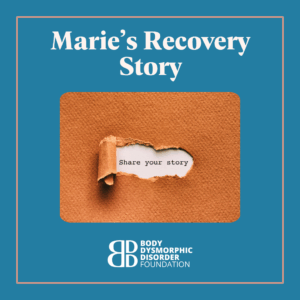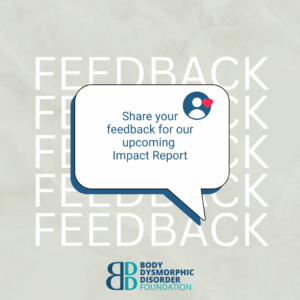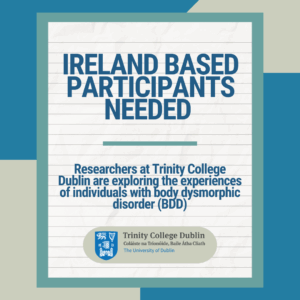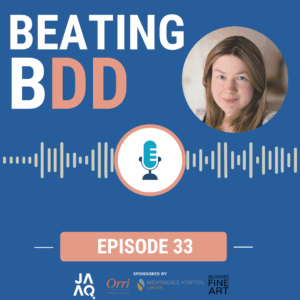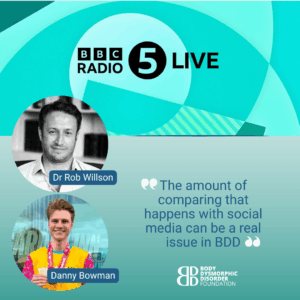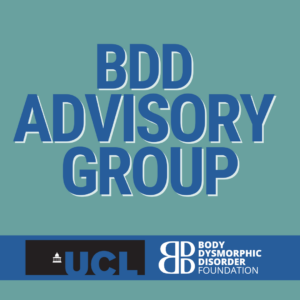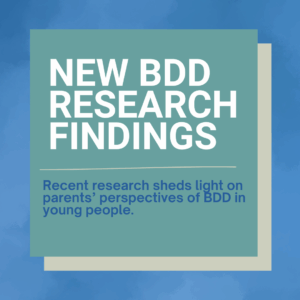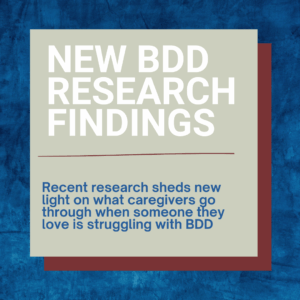My doctor had truly helped me and the reason was a simple one: there had never been anything wrong with my skin. I had a mental condition called Body Dysmorphic Disorder, and the pills were easing the symptoms. My silence had been my enemy: an enemy that had ostracised me from the waking world for fifteen years.
At the age of 18 here I was, the survivor of a huge overdose. I lay in the hospital bed with my family around me, their faces stricken, pale and afraid, asking, ‘Why?’ I had my reasons. Every second was a struggle, and with every waking breath I thought about one thing: my monstrous ugliness. I don’t remember when I started to believe that my skin had begun to thin, to redden and to grow pimples. But one morning as I got ready for school I just couldn’t bear the thought of being exposed and so I raided my mother’s make-up box. I covered my face with her foundation and caught the bus as normal. No one seemed to notice. The taunts of ‘ugly’ and the sarcastic comments of ‘nice hair’ continued unabated, but they were not accompanied by jibes about the fact that I was a man in make-up. I thought about my face all day, worrying that I still looked ugly and worrying that I stuck out like a sore thumb, but no one said anything, and it was better than having no cover for my skin. I was so pleased to get home but I knew it would be the same the next day. From that day on I had to wear make-up.
“Every morning was a battle with the mirror.”
When I left school and got a job as a hospital porter I thought things would change, but they didn’t. Every morning was a battle with the mirror. I would put on make-up, pick at my skin and try to make myself look normal. I didn’t have to be outstandingly handsome; I wasn’t vain. I was a deformed monster and I just wanted to look acceptable. I would be late most days and I was so miserable being on display to the public that I couldn’t do my job. I would hide in the toilets and stare into the mirrors and just wish that I was back home in my dark bedroom where no one could see me. I lost my job, and when I seemed to lose everything else I tried to end my life.
“I dreaded sweating and losing my make-up”
I didn’t tell anyone about my fears relating to my skin; I was too embarrassed by it. And I didn’t think that there was anything anyone could do. I started to see a counsellor and went on prozac. I felt a little better but the problems were still there, my dark secret: that I felt like the phantom of the opera hiding behind my mask. I had to avoid getting wet, so I never went swimming and tried not to leave the house in the rain. I dreaded sweating and losing my make-up. Everyone has thoughts about their appearance, about wanting to look their best, but I was disabled by it. I was in mental anguish every day. All I wanted was to look normal.
When my long-term relationship ended it was at its worst. I was living alone, lonely and at the mercy of my mind. I had a job again, but it was getting harder and harder to make it in each day. I began to set my alarm earlier and earlier so that I had time to sort out my face before facing the guys at work. It went from one hour to three, and I was still late most days, if I made it in at all. I would look from the mirror to my watch, going from room to room to look at myself in different mirrors where the light was different, and might make my reflection more favourable. I would pick at my skin with tweezers and finger nails. I would put the make-up on, smooth it in, and then wash it all off again. I just couldn’t make it go right. I was never happy with how I looked. And when I glanced at my watch and saw that it was already time to be at work and my face still looked awful I would panic, and try to sort it one last time with my heart racing and my breath coming too quick. Then it would seem impossible for me to go to work at all, and I would fall to the bathroom floor and cry pitifully.
“I despaired, and before long the pressure and the pain had got too much for me and I tried to slit my wrists”
I told my boss that I was depressed and that some days it was too hard for me to be at work. That was only half of the story. I was depressed but it wasn’t as simple as that. I couldn’t tell him that even on the days I made it to work I was thinking about how bad I looked and comparing my skin to everyone else wishing I looked human. How could I tell anyone the embarrassing truth? No one would understand, and if I told them I had a problem with my face they would all notice my ugliness even more. I despaired, and before long the pressure and the pain had got too much for me and I tried to slit my wrists.
Despite the help I received from the mental health system it wasn’t long before I was back in hospital, having overdosed on my antidepressant pills. I was getting deeper and deeper into misery and couldn’t cope with even the smallest problem. I was cutting my arms regularly and isolating myself from former friends, even shutting out my family. I would ignore the phone and hide if there was a knock at the door, afraid to let anyone see me without first sorting out my make up.
I didn’t tell the doctors about the main problem because I didn’t want to admit that my face was my main problem. I understood my feelings of depression but I couldn’t justify my appearance worries, they just seemed too trivial. I didn’t tell anyone because I thought the problem was physical, not mental. I really was ugly. I researched online the possibility of having a chemical peel but it was too expensive. I stole tablets from my sister’s house and took a massive overdose that put me in a coma for a day and two nights. I survived, and it made sense that I should now tell my new doctor everything.
That was the best thing I could ever have done. He prescribed me a new antidepressant called Clomipramine that he thought might help with my other worries. I could not have imagined the dramatic effect it would have. Within a few weeks of taking it my skin seemed to improve. The redness of my nose dulled and the pimples seemed less intrusive. I still put on make-up but I did it more from habit than any actual need. I stopped taking the make-up to work with me, stopped thinking about my face for twenty-four hours a day. I would never be completely free from my thoughts but they were not so strong or so all-encompassing as they used to be.
I could begin to live normally, to go out of the house without hours of trauma. My doctor had truly helped me and the reason was a simple one: there had never been anything wrong with my skin. I had a mental condition called Body Dysmorphic Disorder, and the pills were easing the symptoms. My silence had been my enemy: an enemy that had ostracised me from the waking world for fifteen years.
I am now happily married. I still have occasional attacks of BDD but I have had the strength to write about my problems and turn my darkest thoughts into literature. My autobiographical work Suicide Junkie, which goes into detail about my battle with mental health, has now been published by the mental health publisher www.chipmunkapublishing.co.uk.
More stories from the community

